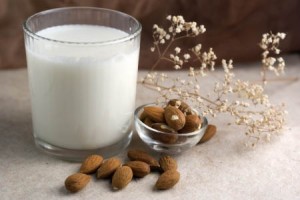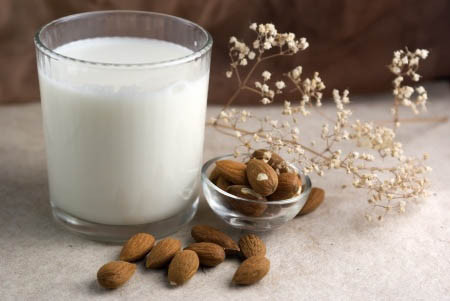Nov 3rd 2025
Home Made Dairy Milk Replacements
 In a commendable effort to avoid dairy, many people have turned to commercially available rice, soy, coconut, hemp and almond milks. Unfortunately we haven’t found a single one of these that we can recommend. They either contain questionable ingredients, like carrageenan, or come in plastic-lined cans that contain Bisphenol A or toxic Bisphenol A replacements.
An alternative is to make your own coconut milk, or nut or seed milk. Although making coconut milk is quite labor intensive, the results are well worth it, as it is truly a delicious treat. Instructions are available on the internet; there is even a way to culture coconut milk to make it into a kefir.
However making nut or seed milks is a breeze. You’ll need a nut milk bag, but these aren’t expensive, last forever, and are easy to find on the internet. In addition, you’ll need a powerful blender, and a source of pure water (see our RO Home Water Treatment System). Soak 1-1/2 to 1/-3/4 cups of raw nuts or raw seeds overnight; then rinse thoroughly, place in blender with 6 cups of pure water, and blend 15-30 seconds. Pour the mixture through your nut milk bag over a large bowl. You’ll need to squeeze the bag to get all the milk out – a little like milking a cow! Your yield will be about 7 cups of fresh milk. Pour it into glass jars and store in the refrigerator. Use the leftover nut or seed pulp for other recipes (an internet search will yield plenty of ideas).
Most nut and seed milks are poor sources of calcium, so you’ll need to get calcium from another source. We suggest Beyond Health Bone Mineral Formula, which provides calcium together with the team of nutrients it needs for proper utilization and especially for building bone.
Some nuts, like hazelnuts, walnuts and Brazil nuts, are quite acidifying. Generally seeds are more alkaline. Almonds are alkalinizing nuts that are excellent for making into nut milk, but it’s very hard these days to get raw, unprocessed almonds. Several years ago the USDA mandated that all “raw” almonds be sterilized by either steam pasteurization (which partially cooks the almonds and destroys some of their nutrients) or by the application of propylene oxide, a toxic carcinogen. The only exceptions are almonds sold directly from farmers to consumers at roadside stands and farmers markets, or almonds that are imported from other countries. Since almost all almond growers reside in California, the only recourse for most of us is to try to find (and pay for) expensive almond imports.
If you’d like to protest this sorry state of affairs, and/or learn more about the almond issue and efforts being made to exempt organic almond growers from this unnecessary and oppressive regulation, go to the Alliance for Natural Health.
In a commendable effort to avoid dairy, many people have turned to commercially available rice, soy, coconut, hemp and almond milks. Unfortunately we haven’t found a single one of these that we can recommend. They either contain questionable ingredients, like carrageenan, or come in plastic-lined cans that contain Bisphenol A or toxic Bisphenol A replacements.
An alternative is to make your own coconut milk, or nut or seed milk. Although making coconut milk is quite labor intensive, the results are well worth it, as it is truly a delicious treat. Instructions are available on the internet; there is even a way to culture coconut milk to make it into a kefir.
However making nut or seed milks is a breeze. You’ll need a nut milk bag, but these aren’t expensive, last forever, and are easy to find on the internet. In addition, you’ll need a powerful blender, and a source of pure water (see our RO Home Water Treatment System). Soak 1-1/2 to 1/-3/4 cups of raw nuts or raw seeds overnight; then rinse thoroughly, place in blender with 6 cups of pure water, and blend 15-30 seconds. Pour the mixture through your nut milk bag over a large bowl. You’ll need to squeeze the bag to get all the milk out – a little like milking a cow! Your yield will be about 7 cups of fresh milk. Pour it into glass jars and store in the refrigerator. Use the leftover nut or seed pulp for other recipes (an internet search will yield plenty of ideas).
Most nut and seed milks are poor sources of calcium, so you’ll need to get calcium from another source. We suggest Beyond Health Bone Mineral Formula, which provides calcium together with the team of nutrients it needs for proper utilization and especially for building bone.
Some nuts, like hazelnuts, walnuts and Brazil nuts, are quite acidifying. Generally seeds are more alkaline. Almonds are alkalinizing nuts that are excellent for making into nut milk, but it’s very hard these days to get raw, unprocessed almonds. Several years ago the USDA mandated that all “raw” almonds be sterilized by either steam pasteurization (which partially cooks the almonds and destroys some of their nutrients) or by the application of propylene oxide, a toxic carcinogen. The only exceptions are almonds sold directly from farmers to consumers at roadside stands and farmers markets, or almonds that are imported from other countries. Since almost all almond growers reside in California, the only recourse for most of us is to try to find (and pay for) expensive almond imports.
If you’d like to protest this sorry state of affairs, and/or learn more about the almond issue and efforts being made to exempt organic almond growers from this unnecessary and oppressive regulation, go to the Alliance for Natural Health.
 Fuel your life with the purest vitamins
Fuel your life with the purest vitamins
